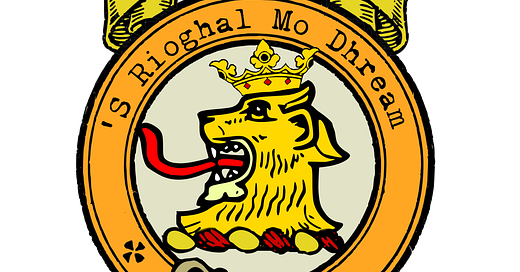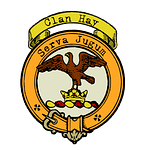Welcome back to "A Clan A Day Podcast," brought to you by bagtownclans.com. I'm your host, Colin MacDonald. Today, we're journeying through the rugged history of Clan MacGregor, a Highland clan whose motto boldly declares, "My race is royal." The MacGregors are a clan whose legacy is as fierce and unyielding as the mountains they called home, a testament to their indomitable spirit and enduring pride.
The origins of Clan MacGregor are shrouded in both legend and history. The clan claims descent from Griogar, reputedly the third son of Alpin, King of Scots, who began his reign in 833. This claim of royal lineage is reflected in their ancient motto. However, like much of early Scottish history, the true lineage of the MacGregors remains partly obscured by time, with their earliest verifiable roots in the Highlands dating back to the reign of Malcolm Canmore (1057-1093).
By the early 13th century, the MacGregors had established themselves as vassals to the powerful Earl of Ross, with Glenorchy as their primary seat. The first recorded chief of the MacGregors, Hugh of Glenorchy, led the clan during these formative years. The MacGregors fiercely defended their land and autonomy against both local rivals and broader threats. Malcolm MacGregor, chief during the time of Robert the Bruce, fought valiantly at the Battle of Bannockburn in 1314, securing his place in Scottish history. However, the clan’s fortunes took a turn when the Campbells, a formidable clan themselves, acquired legal rights to the lands of Glenorchy during the reign of David II.
Despite losing their ancestral lands, the MacGregors continued to assert their presence through sheer force. Their refusal to submit to legal decrees and feudal norms often placed them at odds with both the Scottish Crown and their neighbors. This defiance led to a series of conflicts, most notably against the Campbells, who increasingly encroached on MacGregor territory. By the late 15th century, the MacGregors found themselves largely landless, driven to the fringes of their once vast territories, their survival depending on a combination of cattle raiding and strategic alliances.
The 16th century brought even harsher conditions for the MacGregors. In 1488, under the reign of James IV, a law was enacted aimed at curbing the lawlessness in the Highlands, directly targeting clans like the MacGregors. This marked the beginning of a dark chapter for the clan, as they became infamous for their acts of retribution and defiance against those who sought to suppress them. The "Children of the Mist," as they were often called, retreated into the Highlands, becoming outlaws in their own homeland.
One of the most infamous episodes in MacGregor history occurred in 1603, with the Battle of Glenfruin. Under the leadership of Alasdair MacGregor of Glenstrae, the MacGregors launched a raid against the Colquhouns of Luss, resulting in a devastating defeat for the Colquhouns and the death of 140 men. In retaliation, King James VI issued an edict that effectively outlawed the entire clan, proscribing the name MacGregor and authorizing a campaign of "fire and sword" against them. The edict made it legal to kill a MacGregor without fear of punishment, and the very name was outlawed under penalty of death.
Despite these extreme measures, the MacGregors remained resilient. They took refuge in the most remote parts of the Highlands, using their knowledge of the terrain to evade capture. Their fierce reputation grew, and they continued to raid and resist. The story of Alasdair MacGregor's betrayal and execution in 1604 is a poignant reminder of the harsh realities faced by the clan. Promised safe passage by the Earl of Argyll, Alasdair was instead captured and brought to Edinburgh, where he and eleven of his clansmen were hanged.
The clan's fortunes saw a turn during the Wars of the Three Kingdoms. Many MacGregors, including the famous Rob Roy MacGregor, fought under the royalist banner during the Jacobite risings of the 17th and 18th centuries. Rob Roy, born in 1671, became a folk hero, famously defying the Duke of Montrose and his efforts to suppress the clan. He led a band of men in a campaign of resistance and cattle raiding, using guerilla tactics to outmaneuver his enemies. His exploits were romanticized by Sir Walter Scott, further cementing his place in Scottish lore.
Even after the Jacobite defeat at Culloden in 1746, the MacGregors refused to be fully subdued. It wasn’t until 1784, after nearly two centuries of persecution, that the British Parliament finally repealed the laws against the clan, allowing them to once again bear the name MacGregor openly and reclaim their heritage.
Today, the MacGregor legacy is celebrated by descendants and clan members worldwide. The Clan Gregor Society, founded in 1822, works tirelessly to preserve the history and heritage of this storied clan. From their proud claim of royal blood to their unyielding resistance against all forms of oppression, the MacGregors' story is one of resilience, defiance, and an unwavering commitment to their identity.
Thank you for joining us on this journey through the history of Clan MacGregor. Remember to tune in tomorrow for another episode of "A Clan A Day Podcast." I'm Colin MacDonald, and as always, Go n-éirí an bóthar leat.













Share this post